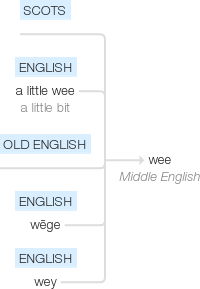Wee
Middle English (originally a noun use in Scots, usually as a little wee ‘a little bit’): from Old English wēg(e) (see wey).
wiktionary
From Middle English wey, weygh, wegh, weȝe, wæȝe(“little bit”), from Old English wǣġ, wǣġe(“ weight”), from Proto-Germanic *wēgō(“scales, weight”) and *wēgǭ(“weight”), related to Middle English weġan(“to move, weigh”) (15c).
Onomatopoeic for the sound of urination. The noun derives from the verb.
wee (personal pronoun)
etymonline
wee (adj.)
"extremely small," mid-15c., from earlier noun use in sense of "quantity, amount" (such as a littel wei "a little thing or amount," c. 1300), from Old English wæge "weight, unit of weight," from Proto-Germanic *wego, from PIE root *wegh- "to go, move, transport in a vehicle." The original sense was of motion, which led to that of lifting, then to that of "measure the weight of" (compare weigh, from the same source).
Adjectival use wee bit apparently developed as parallel to such forms as a bit thing "a little thing." Wee hours "hours after midnight" is attested by 1891, from Scottish phrase wee sma' hours (1819); so called for their low numbers. Wee folk "faeries" is recorded from 1819. Weeny "tiny, small" is from 1790.
